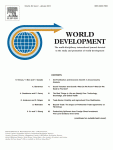FILTER
Displaying 1891 - 1900 of 2428 publications
In this article we investigate whether people's donations in the field are affected by the presence of others. In the analysis, we distinguish between individuals who arrived at a national park alone…
| Peer Reviewed | Central AmericaThe present paper presents key sector research for the Namibian economy, based on input–output and Social Accounting Matrix (SAM) analyzes. The analyses were derived from a Namibian SAM for the 2004…
| Peer Reviewed | Sweden, South AfricaThe heavy dependence and inefficient utilization of biomass resources have contributed to the depletion of forest resources in Ethiopia, while the use of traditional cooking technology has also been…
| Peer Reviewed | EthiopiaPatterns of forest cover and forest degradation determine the size and types of ecosystem services forests provide. Particularly in low-income countries, nontimber forest product (NTFP) extraction by…
| Peer Reviewed | TanzaniaAnalytical hydrologic models and the design of policy instruments for groundwater-quality management
This paper explores how analytical hydrologic models can inform the effective design and choice of policy instruments to manage groundwater quality by coupling a social-planner’s problem of optimal…
| Peer Reviewed |We examine risk preferences in an urban setting in a low-income developing country with nonstudent subjects by adapting the experimental approach of Holt and Laury (HL; 2002). We conducted 22 group…
| Peer Reviewed | SwedenWe use survey data to investigate how urban households in Ethiopia coped with the food price shock in 2008. Qualitative data indicate that the high food price inflation was by far the most adverse…
| Peer Reviewed | Sweden, Ethiopia, Global HubThis study measures the public preferences for cultivated land protection as a case study of Wenling City, China, using the choice experiment (CE) approach. The estimation results indicate that the…
| Peer Reviewed | VietnamCredit risk is perhaps the oldest and most challenging risk for banks. The risk emanates from the probability that borrowers will default on terms of debt, subsequently putting the capital of a bank…
| Peer Reviewed | KenyaDespite the importance of non-wood forest products (NWFPs) in household consumption especially in Nigeria, where 47 million people were unable to meet the 2,900 kcal food requirement in 2004, they…
| Peer Reviewed | Nigeria